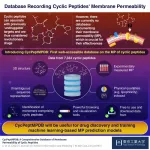(Press-News.org) ARLINGTON HEIGHTS, Ill. (April 5, 2023) – Hereditary angioedema (HAE) is a disease that, due to its rare nature, can pose difficulties for both patients and medical professionals. A new survey of allergists/immunologists from the American College of Allergy, Asthma and Immunology (ACAAI) shows that diagnosing, treating and managing this condition can be challenging for patients and healthcare providers - including patients in rural areas. An article about the survey is published in Annals of Allergy, Asthma and Immunology, ACAAI’s scientific journal.
HAE is caused by a genetic mutation, and there are different types. It is a hereditary disease. The symptoms of HAE include sudden swelling, most commonly in the limbs, face, intestinal tract, and airway. Swelling of the airway can be life-threatening. Allergists and immunologists are specialists who can help diagnose and treat HAE patients. Treatment of HAE involves both on-demand therapy, which is used to minimize the effects of an HAE attack, and prophylactic treatment, which is used in appropriate patients to reduce the frequency and severity of attacks.
The survey was conducted by The Harris Poll on behalf of ACAAI. Survey participants were recruited by email from ACAAI’s member mailing list. A total of 2,996 members were contacted and asked to complete an online survey. To be eligible for the survey, participants had to be an association member (physician or allied health professional) in the United States who was currently practicing allergy or immunology and seeing or treating at least one patient with HAE each year. The 138 members who responded saw an average of nine patients with HAE yearly. Due to the small sample size across urbanicity (n<100), results should be interpreted as directional only.
“More than a tenth (12%) of the allergist/immunologist respondents had patients who lived in rural areas,” said allergist J. Allen Meadows, MD, ACAAI past president and corresponding author of the article. “It is significant that respondents with HAE patients living in rural areas (compared with urban or suburban) were more likely to say half or more must travel an hour or more to get to their practice – highlighting a potential barrier to care,” said Dr. Meadows.
Other findings of the survey included:
Misdiagnosis was among the top challenges reported (82%) for diagnosing HAE patients. According to ACAAI, although genetic testing is available, it does not test for all known variants.
Other challenges inherent to the treatment of HAE are economic ones. Inability of patients to afford treatment, such as medications, was among the top challenges of treating HAE patients (76%), and 62% of the respondents discussed the cost of care with their patients at about half or more visits.
Nearly two-thirds of respondents (64%) agreed that patients with government insurance coverage are at a disadvantage since it is not accepted by specialists who treat HAE. They also reported that better payments for drugs from Medicaid and Medicare (57%) and better payments to providers from Medicaid and Medicare (49%) could improve support for treatment of patients in rural settings.
A majority of respondents (86%) have been using telehealth appointments at least occasionally since the COVID-19 pandemic began, and more than 2 in 5 (45%) thought that changing federal telehealth rules to allow more people to use these services, without the current onerous requirements, could better support the treatment of patients living in rural areas.
The authors of the paper urged the following calls to action:
Universal availability of more accurate and rapid testing.
Equity in payments for doctor and hospital services for people with Medicare and Medicaid who live in rural areas.
Permanent expansion of telehealth services.
Better awareness of and education about this rare disease
In conclusion, the authors state, “Awareness and education remain a great need for all rare diseases. Fifty percent of our respondents agreed that patient education and support groups could better support the treatment of patients in rural settings. We applaud our fellow providers for their efforts to educate patients with HAE and their families.”
The full article can be found in Annals of Allergy, Asthma and Immunology, the scientific journal of the American College of Allergy, Asthma and Immunology. Takeda Pharmaceuticals USA, Inc. provided support in writing and editing of this manuscript through an independent medical education grant.
About ACAAI
ACAAI is a professional medical organization of more than 6,000 allergists-immunologists and allied health professionals, headquartered in Arlington Heights, Ill. The College fosters a culture of collaboration and congeniality in which its members work together and with others toward the common goals of patient care, education, advocacy, and research. ACAAI allergists are board-certified physicians trained to diagnose allergies and asthma, administer immunotherapy, and provide patients with the best treatment outcomes. For more information and to find relief, visit AllergyandAsthmaRelief.org. Join us on Facebook, Pinterest and Twitter.
Research Method
The research was conducted online in the United States by The Harris Poll on behalf of the American College of Allergy, Asthma and Immunology among 138 ACAAI Members (Physician Members, Fellows, and Allied Health Professionals [(Nurse Practitioner/Physician Assistant]) in the US who are currently practicing allergy/immunology and see/treat at least one patient with hereditary angioedema (HAE) each year. Members were recruited from ACAAI’s Member Mailing List. The survey was conducted April 13 – May 3, 2022.
Raw data were not weighted and are therefore only representative of the individuals who completed the survey.
Respondents for this survey were selected from among those who have agreed to participate in our surveys. The sampling precision of Harris online polls is measured by using a Bayesian credible interval. For this study, the sample data is accurate to within + 8.2 percentage points using a 95% confidence level. This credible interval will be wider among subsets of the surveyed population of interest. All sample surveys and polls, whether or not they use probability sampling, are subject to other multiple sources of error which are most often not possible to quantify or estimate, including, but not limited to coverage error, error associated with nonresponse, error associated with question wording and response options, and post-survey weighting and adjustments.
END
Survey of allergists/immunologists reveals management of hereditary angioedema differs by region
Patients living in rural areas more likely to face barriers to care
2023-04-05
ELSE PRESS RELEASES FROM THIS DATE:
SynGAP Research Fund awards a collaborative grant to Tang Lab & AXONIS Therapeutics
2023-04-05
PALO ALTO, Calif. (April 5, 2023) – SynGAP Research Fund (SRF), a 501(c)(3) public charity whose mission is to improve the quality of life for SYNGAP1 patients through the research and development of treatments, therapies and support systems, today announced they have awarded a $130,000 collaborative grant to the lab of Xing Tang, PhD at Boston Children's Hospital & AXONIS Therapeutics to investigate the treatment effects of KCC2-enhancing small molecule compounds in SYNGAP1 haploinsufficiency.
Principal Investigator of translational neuroscience at AXONIS, Dr. Kadam, has been working with the SRF community for many years. While at Johns Hopkins, she gave a popular SRF ...
Manganese in Central Valley water threatens fetuses and children
2023-04-05
Water in California’s Central Valley contains enough manganese to cause cognitive disabilities and motor control issues in children, and Parkinson’s-like symptoms in adults.
A naturally occurring metal, manganese is found in water supplies throughout the world. It is regulated as a primary contaminant in many Southeast Asian countries where the climate causes it to leach into groundwater. However, in the U.S. it is regulated only as a secondary contaminant, meaning no maximum level is enforced.
A ...
Do altered gut microbes affect risk of attention-deficit/hyperactivity disorder?
2023-04-05
New research published in the Journal of Child Psychology and Psychiatry suggests that the microbial composition of the gut may affect a child’s susceptibility to attention-deficit/hyperactivity disorder (ADHD).
The human gastrointestinal tract hosts a large population of microorganisms such as bacteria, viruses, and fungi. When investigators compared fecal samples from 35 children with ADHD and 35 healthy controls, samples from children with ADHD had higher levels of certain species of fungi and lower levels of other species.
In experiments with cells grown in the lab, one species in abundance in ...
Can a drug used to treat liver disease help prevent SARS-CoV-2 infections and lessen COVID-19 severity?
2023-04-05
SARS-CoV-2, the virus that causes COVID-19, attaches to a cellular receptor called angiotensin-converting enzyme 2 (ACE2), and activation of the farnesoid X receptor increases ACE2 expression. New research published in the Journal of Internal Medicine suggests that a drug that inhibits the farnesoid X receptor and is used to treat liver disease may decrease SARS-CoV-2 infections and reduce the severity of COVID-19.
The study ran from March 2020 to February 2022 and included 3,214 patients with liver disease, half of whom were taking the drug, called ursodeoxycholic acid (UDCA). ...
Can some snakes do cartwheels to escape or startle predators?
2023-04-05
In research published in Biotropica, investigators report that the Dwarf Reed Snake (Pseudorabdion longiceps) performs cartwheels when threatened. This is the first time such an active rolling motion has been documented in snakes, with images and a detailed description.
The Dwarf Reed Snake is a nocturnal, small snake that lives in regions of Southeast Asia. Typical defense mechanisms that small snakes use against predators include fleeing, camouflage, coloration, odors, death-feigning, and intimidation. ...
Can phototherapy improve cognitive function in patients with dementia?
2023-04-05
In an analysis of published clinical trials, investigators found that phototherapy—or exposure to sessions of bright light—may be a promising non-pharmacological intervention for lessening symptoms of dementia.
The analysis in Brain and Behavior included 12 randomized clinical trials. Results indicated that phototherapy improved cognitive function in patients with dementia, but it did not affect symptoms of depression or sleep quality.
“Further well-designed studies are needed to explore the most effective clinical implementation ...
Could a novel small molecule slow or reverse the effects of Duchenne muscular dystrophy?
2023-04-05
In a new study published in The FASEB Journal, investigators demonstrated the potential of a molecule that may help overcome some of the devastating symptoms of Duchenne muscular dystrophy (DMD), the most common life-limiting congenital neuromuscular disorder. The agent promotes the activity of AMP-activated protein kinase (AMPK), an important fuel-sensing enzyme that is present in all mammalian cells.
Previous research has shown that stimulating AMPK can mitigate the dystrophy—or wasting—of muscles, but AMPK activators have failed to reach the clinic due to either their lack of potency or toxic off-target effects.
In ...
CycPeptMPDB: A database aimed at promoting drug design using cyclic peptides
2023-04-05
CycPeptMPDB, a novel database—created by Tokyo Tech researchers—focused on the membrane permeability of cyclic peptides, could accelerate the development of drugs based on these promising compounds. This database was created by gathering published information on thousands of cyclic peptides and organizing it neatly in an online-accessible platform. Thanks to its search and visualization capabilities, CycPeptMPDB could pave the way to new computational and machine learning methods for screening and designing drugs with cyclic peptides.
One of the ...
Brain injury toolkit helps support domestic violence survivors
2023-04-05
COLUMBUS, Ohio – A new approach to trauma-informed care developed by domestic violence survivor advocates and researchers at The Ohio State University has been found in a new study to improve support organizations’ care for survivors by better recognizing brain injury and addressing its often long-lasting repercussions.
The study appears in the Journal of Head Trauma and Rehabilitation.
CARE is the first trauma-informed approach that considers brain injury in the complex set of circumstances to be addressed and accommodated in order ...
Aging at AACR Annual Meeting 2023
2023-04-05
Impact Journals (Aging's publisher) is proud to participate at the American Association for Cancer Research (AACR) Annual Meeting 2023, which convenes April 14-19 in Orlando, Florida.
BUFFALO, NY-April 4, 2023 – Impact Journals will be participating as an exhibitor at the American Association for Cancer Research (AACR) Annual Meeting 2023 from April 14-19 at the Orange County Convention Center in Orlando, Florida. This year, the AACR meeting theme is: “Advancing the Frontiers of Cancer Science and Medicine.”
Impact ...
LAST 30 PRESS RELEASES:
Cal Poly’s fifth Climate Solutions Now conference to take place Feb. 23-27
Mask-wearing during COVID-19 linked to reduced air pollution–triggered heart attack risk in Japan
Achieving cross-coupling reactions of fatty amide reduction radicals via iridium-photorelay catalysis and other strategies
Shorter may be sweeter: Study finds 15-second health ads can curb junk food cravings
Family relationships identified in Stone Age graves on Gotland
Effectiveness of exercise to ease osteoarthritis symptoms likely minimal and transient
Cost of copper must rise double to meet basic copper needs
A gel for wounds that won’t heal
Iron, carbon, and the art of toxic cleanup
Organic soil amendments work together to help sandy soils hold water longer, study finds
Hidden carbon in mangrove soils may play a larger role in climate regulation than previously thought
Weight-loss wonder pills prompt scrutiny of key ingredient
Nonprofit leader Diane Dodge to receive 2026 Penn Nursing Renfield Foundation Award for Global Women’s Health
Maternal smoking during pregnancy may be linked to higher blood pressure in children, NIH study finds
New Lund model aims to shorten the path to life-saving cell and gene therapies
Researchers create ultra-stretchable, liquid-repellent materials via laser ablation
Combining AI with OCT shows potential for detecting lipid-rich plaques in coronary arteries
SeaCast revolutionizes Mediterranean Sea forecasting with AI-powered speed and accuracy
JMIR Publications’ JMIR Bioinformatics and Biotechnology invites submissions on Bridging Data, AI, and Innovation to Transform Health
Honey bees navigate more precisely than previously thought
Air pollution may directly contribute to Alzheimer’s disease
Study finds early imaging after pediatric UTIs may do more harm than good
UC San Diego Health joins national research for maternal-fetal care
New biomarker predicts chemotherapy response in triple-negative breast cancer
Treatment algorithms featured in Brain Trauma Foundation’s update of guidelines for care of patients with penetrating traumatic brain injury
Over 40% of musicians experience tinnitus; hearing loss and hyperacusis also significantly elevated
Artificial intelligence predicts colorectal cancer risk in ulcerative colitis patients
Mayo Clinic installs first magnetic nanoparticle hyperthermia system for cancer research in the US
Calibr-Skaggs and Kainomyx launch collaboration to pioneer novel malaria treatments
JAX-NYSCF Collaborative and GSK announce collaboration to advance translational models for neurodegenerative disease research
[Press-News.org] Survey of allergists/immunologists reveals management of hereditary angioedema differs by regionPatients living in rural areas more likely to face barriers to care


